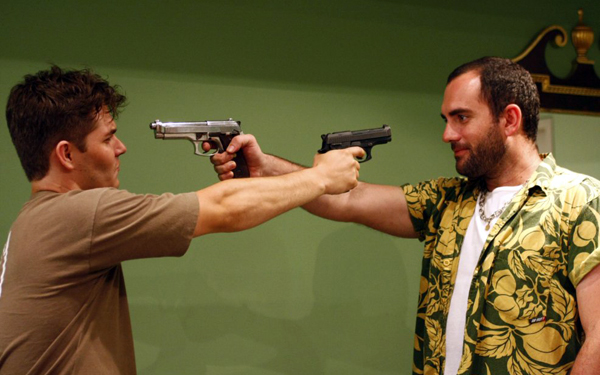By Ramona Zacharias.

Afonso Poyart
Brazilian filmmaker Afonso Poyart’s debut feature is literally a picture of creativity. A fast-paced, high-octane action flick that excited an audience unused to seeing such special effects at the cinema, the English-subtitled 2 Coelhos was first released in Brazil in 2012, has since made appearances at various film festivals, and is now available on VOD and iTunes (under its English title of Two Rabbits).
Stylistically speaking, Poyart blends elements of Guy Ritchie and Quentin Tarantino to produce a visually eclectic film that often feels a bit like a video game; an effect that is driven home by the young writer/director’s playful approach to timelines and use of a high-energy soundtrack.
Starring Fernando Alves Pinto, Alessandra Negrini and Caco Ciocler, the movie centers on Edgar (Pinto), a young man from Sao Paolo with a secret past and seemingly shady future. Gangsters and corrupt politicians abound in this tale, societal elements not uncharacteristic of Poyart’s hometown.
Soon after the movie’s release in Brazil, Poyart was tapped to direct Sean Bailey and Ted Griffin’s 2016 film Solace, starring Anthony Hopkins, Colin Farrell and Jeffrey Dean Morgan. I recently spoke with him about the two very different experiences and about his transition from early work in commercials to Brazilian films to Hollywood.

Caco Ciocler as Walter and Fernando Alves Pinto as Edgar in Two Rabbits
I understand you worked extensively in commercials before this project. What made you move to feature films?
I guess I always wanted to do films and I saw commercials as a way to get involved in that. I always had a deep love of films and eventually wanted to be making them, so I did commercials for a long time and I did them well. But at some point I thought that I needed to reconnect with my real goal, which was to make movies. So I decided to take a step back and reevaluate.
You clearly have a very specific style when it comes to filmmaking. What types of films did you watch to help shape that style? Were you influenced by other mediums, such as video games and comics?
I’m actually not much into comics, but I am very much into video games. There is actually a video game in the movie and also references to them.
In terms of movies, I love Christopher Nolan – especially his work in narrative and speech, even in some of his earlier movies. Like how elements are revealed over the course of the film. And of course, Guy Ritchie and Tarantino. I also really like Alejandro Gonzalez Iñarritu.
Because this was my first movie, I was very open to doing whatever I wanted in a way where I was not really trying to mimic or follow one style. I was trying to use everything that I had in my head as a good reference.

Director Alejandro G. Iñárritu and Leonardo DiCaprio on set of The Revenant
Could you talk a little bit about your approach to narration and storytelling in this film, specifically your use of timelines? What effect did you want it to have in terms of character development?
Well, the main character has a personal agenda that doesn’t reveal itself right away. So we’re trying to understand him as the movie progresses. That was the idea – I wanted to do something where it would take time to understand what the real intentions of his actions were.
At first it looks like he’s just part of a social justice plot where he gets involved with this corrupt politician…but then we learn it’s much more elaborate than that, and much more personal than that. His actual motives reveal what’s really a very crazy way of thinking, but that’s him. He’s a nerd who plays a lot of video games.
Obviously the topics you deal with – corrupt politicians, gangs – are somewhat universal themes. But is what you portray characteristic of life in Sao Paolo? How did audiences receive it when it was first released?
Yeah, I feel like criminals and corruption exist everywhere…but especially here in Brazil, there is a lot! You see a lot of it on the news and just everywhere in general.
I wanted to do something that involved the “common guy”. But the funny thing is, audiences didn’t relate to those issues as much as they did the emotional themes and the character’s personal desire to give back something he took. They connected more with the story than the social justice issues the movie portrays. I felt like people remembered much more the problems he had to solve in his personal life and his relationship than anything else.

Fernando Alves Pinto as Edgar and Alessandra Negrini as Júlia in Two Rabbits
What is the climate like in Brazil for aspiring writers?
Well, there’s a lot of TV work because of some government laws here requiring the airing of national content on cable television. But other than that, the movie business is very small. There are maybe two handfuls of writers who work a lot in the market.
But I should say that there are a lot of mechanisms to finance movies. It’s a good place to work on smaller projects – and you can have a lot of control over your material here.
You’ve had a feature film made in Brazil, and now you’ve had another made in Hollywood, with Solace. How different were those experiences for you?
They were very different experiences, because this movie was much smaller filmmaking. I had very little money and a lot of control. I was the producer, the writer and the director.
Three months ago, after 2 Coelhos opened here, I was hired to do Solace. It was a big project – not a huge movie, but it was much bigger than 2 Coelhos. Anthony Hopkins and Colin Farrell…those are two major stars. There was a lot more bureaucracy with the development and also in the production phase. I had a producer that I needed to involve. It was just a much more complicated agenda for a filmmaker than with my first movie, which I had much more control over.

Anthony Hopkins as John Clancy in Solace
Do you have any advice that you could offer our readers?
I think you should just force yourself into writing. Sometimes you don’t have good days as a writer. Set aside some time in your day – like three hours a day where you’re going to just sit down and write. Some days you’re going to write something good and some days you’re going to write something not so good. But you’re going to create these mechanisms to get your script done.
Sometimes it’s hard to push yourself into doing something original. If you have an original idea, push yourself to create some organization in your life so you can write every day. That’s the way to get something done.

